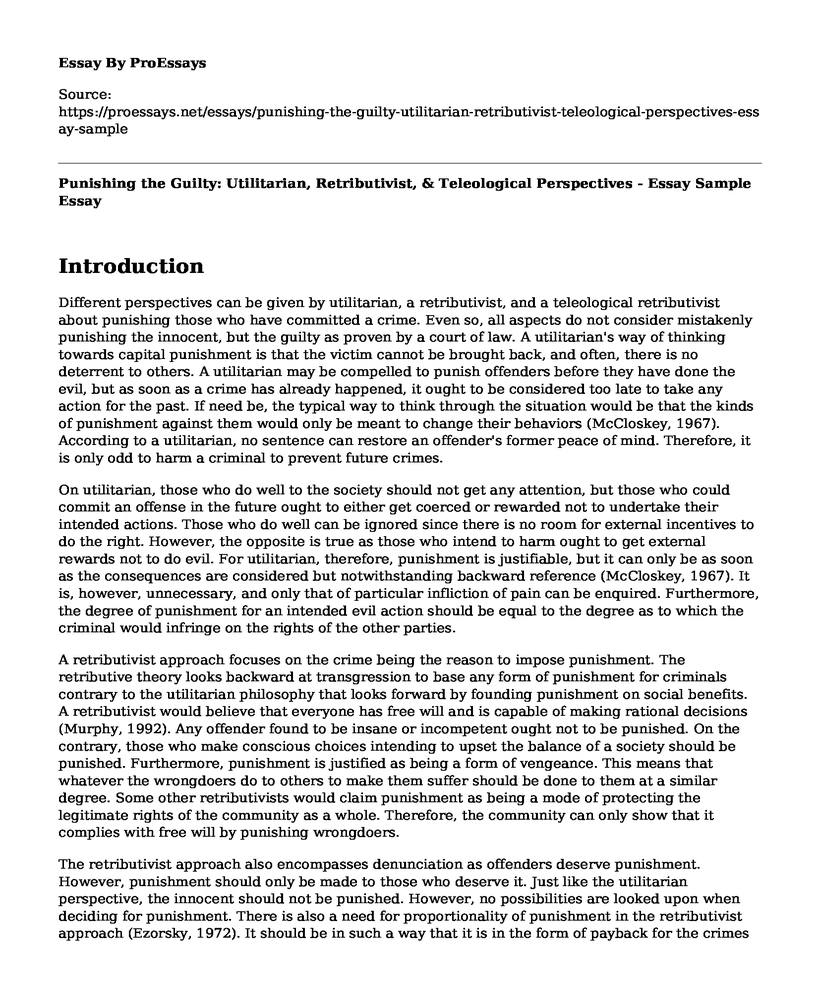Introduction
Different perspectives can be given by utilitarian, a retributivist, and a teleological retributivist about punishing those who have committed a crime. Even so, all aspects do not consider mistakenly punishing the innocent, but the guilty as proven by a court of law. A utilitarian's way of thinking towards capital punishment is that the victim cannot be brought back, and often, there is no deterrent to others. A utilitarian may be compelled to punish offenders before they have done the evil, but as soon as a crime has already happened, it ought to be considered too late to take any action for the past. If need be, the typical way to think through the situation would be that the kinds of punishment against them would only be meant to change their behaviors (McCloskey, 1967). According to a utilitarian, no sentence can restore an offender's former peace of mind. Therefore, it is only odd to harm a criminal to prevent future crimes.
On utilitarian, those who do well to the society should not get any attention, but those who could commit an offense in the future ought to either get coerced or rewarded not to undertake their intended actions. Those who do well can be ignored since there is no room for external incentives to do the right. However, the opposite is true as those who intend to harm ought to get external rewards not to do evil. For utilitarian, therefore, punishment is justifiable, but it can only be as soon as the consequences are considered but notwithstanding backward reference (McCloskey, 1967). It is, however, unnecessary, and only that of particular infliction of pain can be enquired. Furthermore, the degree of punishment for an intended evil action should be equal to the degree as to which the criminal would infringe on the rights of the other parties.
A retributivist approach focuses on the crime being the reason to impose punishment. The retributive theory looks backward at transgression to base any form of punishment for criminals contrary to the utilitarian philosophy that looks forward by founding punishment on social benefits. A retributivist would believe that everyone has free will and is capable of making rational decisions (Murphy, 1992). Any offender found to be insane or incompetent ought not to be punished. On the contrary, those who make conscious choices intending to upset the balance of a society should be punished. Furthermore, punishment is justified as being a form of vengeance. This means that whatever the wrongdoers do to others to make them suffer should be done to them at a similar degree. Some other retributivists would claim punishment as being a mode of protecting the legitimate rights of the community as a whole. Therefore, the community can only show that it complies with free will by punishing wrongdoers.
The retributivist approach also encompasses denunciation as offenders deserve punishment. However, punishment should only be made to those who deserve it. Just like the utilitarian perspective, the innocent should not be punished. However, no possibilities are looked upon when deciding for punishment. There is also a need for proportionality of punishment in the retributivist approach (Ezorsky, 1972). It should be in such a way that it is in the form of payback for the crimes committed by an individual. Justice, in the case of retributivism, seeks to compensate for a crime. Failure to punish can only be termed as an injustice since the wrongdoers do not receive that which they deserve.
The teleological retributivist approach to punishment seeks to explain punishment as being a means to some good. This could be either general or individual, where questions are asked until a prudentially sufficient answer is reached. It is the obligation of every state to protect the citizens by deterring any potential offenders (Murphy, 1992). However, this is concisely done through threatening punishment. Otherwise, some may consider lesser extents that include preventing offenders from playing the offense. The teleological retributivist believes more in imprisoning criminals as a way of punishment for offenses (Murphy, 1992). Such forms of punishment are meant to exclude greater evils by reducing the misery and insecurity created by a crime. This is intended to yield some desirable later effects. Every action should serve some good in society.
Teleological retributivists believe in penal laws as a way of yielding various demonstrable beneficial consequences. It is considered unjust to handle crime through inflicting suffering on its own. Every teleological aim should be held in check by multiple principles of justice for a just cause to be perceived (Murphy, 1992). Focusing primarily on justice ensures that punishment is desirable either for the guilty or society as a whole. For an individual, they are made better people, and for the world, criminals and offenders are isolated and reformed (Ezorsky, 1972). All these are intended to make the world a better place. From a general perspective, teleological retributivists can be seen as being mediators between teleological principles and the principles of justice maintained by retributivists.
References
Ezorsky, G. (1972). The ethics of punishment. Philosophical perspectives on punishment.
McCloskey, H. J. (1967). Utilitarian and Retributive Punishment. Journal of Philosophy, 64(3), 91-110. doi:10.2307/2024096
Murphy, J. G. (1992). Retributivism, Moral Education, and the Liberal State. In Retribution Reconsidered (pp. 15-30). Springer, Dordrecht. doi:10.1007/978-94-015-7922-3_2
Cite this page
Punishing the Guilty: Utilitarian, Retributivist, & Teleological Perspectives - Essay Sample. (2023, Feb 27). Retrieved from https://proessays.net/essays/punishing-the-guilty-utilitarian-retributivist-teleological-perspectives-essay-sample
If you are the original author of this essay and no longer wish to have it published on the ProEssays website, please click below to request its removal:
- The Effect Undocumented Labor Has on Wages in the Construction Industry
- Universal Healthcare vs. the Affordable Care Act Essay
- Major Functions of the Four Agencies of the Department of Justice Essay
- The Most Recent Trends in Sentencing - Paper Example
- Essay Sample on The Relationship between Crime and Immigration
- Essay Sample on The Well-Being of Women and Girls
- Privacy: The Dangers of Overexposing Personal Information - Essay Sample







